GHR Honda Team Site & Blog
Archive for year 2011
Day 8: Antofagasta > Copiapo
Jan 11th
The hours ticked by today and I thought I wasn’t going to get to chat to Glenn today. It so happened that they’d just been busy and were just about to knock off for the day. That said, it was after midnight and I could still hear impact drivers going.
Today was the first day that Jacob Smith received anything approaching a “break”. He started the day 44th on the stage and by WP1 he had set the 24th fastest time in spite of the dust and traffic. There were no mechanical or tank related issues, and perseverance saw him finish 19th just 3 minutes behind David Casteu. Currently he stands 27th overall, two positions up the rankings. All are justifiably pleased with the day considering just how difficult the stage had been even at the new “shortened” length.
This was the clear run Jacob was after when we spoke yesterday. He managed the navigation well and hit all the waypoints. The only real reason he lost time today was the dust. He passed at least 10 riders, and is set for a start within the top 20 on tomorrow’s “looped” dunes stage beginning and ending in Copiapo. The curve ball with this stage will be the group start!
The service last night revealed the specific cause of Jake’s stoppage drama yesterday. This was not the “known” tyre clearance problem with the rear tanks, so far solved by shaving the sides of the rear tyres. The rear tank failed at the 3km mark yesterday because of damage inflicted during manufacture. On close inspection, it appears that the tool used to separate the moulds used in forming had harmed the tank on the inside of the airbox – an area that is hard to inspect and that normally wouldn’t be cause for concern. It was a one-off fault limited to that single tank only but it was enough to ruin the day. The compromised section started to leak as soon as the bike was ridden on rough terrain.
The team are delighted to report that up to this point the engines and gearboxes have proven to be incredibly resilient, while they take note of the empty chassis in other bikes on service nights. Jake’s machine was fitted with a new engine over the rest day as a matter of course, but did not actually appear to need it. Warren’s bike had not been touched and it had completed the whole first week bar the 30km not covered as a result of his crash. The air intakes on all bikes have been kept remarkably clean considering the bull-dust conditions the filters have been forced to tolerate, and not even a single clutch plate has been required. The worrisome issue for many teams has been longevity of their 450cc machines, and once more there were failures today.
It’s been an interesting insight as an outsider to see how the collective attitude has evolved during the event. The first week featured sadness, frustration, shock and awe.
The sadness was felt by all when one of the four riders had to leave for home in tragic circumstances before the engines were warmed for competition.
Widespread frustration came with the delays in accessing the gear shipped in advance, then as a result of “debut blunders” and then component problems. Glenn had hoped to put at least one of the riders in the top 20 for the event based on prior understanding of their speed and reliability. The plan was let down by the reliability or lack thereof brought about by the outsourced components. The team had no reason to expect the fuel tank dramas and GPS failures encountered so far. There isn’t a clear way to react to or plan around such failures other than to build everything at home and conduct sufficient destructive testing and intentional abuse to be able to consider them Dakar proof.
Nobody expected to be so shocked by how vast some of the organisational differences are. Each and every day people are nearly killed on the transports. Everyone in the team had become accustomed to the common sense approach taken to transport sections on Safari, where the organisers keep track of how punctually the riders assemble at the start of the special stages. If the riders are all on schedule, the time allowed was obviously appropriate. If three quarters of the field are not on time, the organisers realise this and factor it in on following days so the competitors do not have to endanger themselves. Nobody at GHR was prepared for just how many risks Dakar competitors have to take to get to the start line by their allotted departure time, and the blame for this lies at the feet of the organisers who incidentally still complain about the way people are driving. Because of the way the ASO start the stopwatch at the prescribed start times regardless of whether the competitor has arrived in time or not, they have no way to accurately assess whether or not their planning was reasonable and there is no flexibility on this. All three of the GHR riders who started the event fell foul to this very problem.
There is now detailed list of things to alter for next time – adjusting weight allocation and handling characteristics are but two examples. None of the proposed geometry changes are hard to execute in the confines of development at home, but they are impossible to change during the race. The differences between Safari and Dakar are now becoming quite clear. Some are subtle and many are not, but none could be accurately quantified without jumping out of the pot and into the fire. This is all part of why the team are in Dakar this year.
Certainly, all the setbacks have toughened the characters of everyone but Glenn’s buoyant tone today reflects the sentiments of the whole team. If Dakar were easy, nobody would come all this way do it. GHR have now discovered first hand the magnetism that draws people from across the globe. Therein lies the awe. Bring on Day 9…
Day 7: Arica > Antofagasta
Jan 10th
I had a call from Jacob Smith at the end of Day 7 their time. Right off the start, Jacob struck trouble with a leaking fuel tank causing the bike splutter to a halt.
Ed: Hi Jake, yet another frustrating day today…
JS: Yeah. It’s been like that the whole week! But at least we made it in at the end. I didn’t think I was going to… thought it was a case of race over. I was pretty happy just to get it moving again, but I’ve actually still come up in the overall standings (currenty 29th). It could have been a lot worse than it is!
Ed: Did it take you long to work out what was up?
JS: When it stopped I knew it was something electrical or it was flooding. Turned out to be flooding, and when I tipped the bike on the side I saw the fuel running out the bottom of the tank. As quick as I could, I took the tank and the seat off, swapped the plug over, drained the carby in case the tank had picked up some dirt. I had to nurse it for the next 50km partly because it wasn’t running well, but also because I wouldn’t have made it with the fuel range. It was just one of those things.
Ed: Looking at the timing for the waypoints, you lost 38 minutes in the run from the start to WP1, but as soon as you were running again you started climbing the standings. The persistent theme here is that no matter what things conspire against you, you are riding fast and cleanly.
JS: Yes, definitely. I’ve ridden with a few of the guys further up the front and stuck with them easily. I’m setting OK times in the pack, but plenty of the time I’ve had to just cruise in 2nd or 3rd because I can’t see for all the dust.
Ed: Today sounded very dusty…
JS: Yeah, it was. Just as bad as any other day especially passing the quads. Behind them you can’t see a thing. Stopping to 35 minutes to fix the bike puts you right in the middle of the slower riders. I passed probably 30 today. I came in 43rd for the stage having started in the 50s. Time for the first sector was right near the bottom.
Ed: Other than issues with the GPS units misbehaving, you seem to have your head around the navigation fairly well now.
JS: I’m picking it up. At the moment I keep finding that I need to do the navigation very carefully. When you get stuck at the back, there are tracks everywhere that make the going even more confusing. I need to choose carefully. The tracks just go everywhere at the waypoints. Certainly I’ll be a lot wiser for next year.
Ed: You’ve had some testing days, but what’s been the highlight so far?
JS: The crowds. Mate, they are unbelievable! I can’t really put it into words… It’s like the Tour de France in all the towns. I pull up to a red light and everyone just rushes up. They just want to touch you, get your autograph and cheer you on. It just blows me away. Even in the really early starts at 4.30 or 5.00 am there are just thousands of people lining the roads.
Ed: One of the pictures that came through before Mark came off was of him talking to a crowd of people all with cameras on the other side of the bivouac fence.
JS: That night was incredible. I woke up to the noise of the crowd at 3.30am the next morning. Those masses of people just stayed there all night and didn’t sleep. They’re fanatics!
Ed: Speaking of sleep, you must come in pretty worn out but still worn out at the end of the stage. Obviously you still have lots to do. What’s your wind-down routine to start the job of sleeping?
JS: The first week was pretty hectic. The crew helped as much as they could. I’d sit down for 20 minutes and have something to eat, then go off and shower. I’d have to do the road book, pack my backpack and water, get the riding gear ready, set up my bed. The first week it just felt like I didn’t stop. Just going to the showers or toilets or the phone, it’s a real hike to get there especially when you have to go 4 times at 20 minutes a go. Getting into a routine really helps – in bed by 10.30 and then awake at 3.30 for riders’ briefing. It’s a gruelling schedule, but since Mark’s not longer riding he has been helping me out heaps. Mark and Arja (a local contact for the team) have been doing my road books which saves me time.
Ed: Mark has described himself as your “dog’s body”.
JS: That’s it! He’s been doing an awesome job. Today I was able to come in, shower and then go lie down on the stretcher straight away for half an hour while they started my preparations. It makes such a difference when you don’t have to worry about all the little things. That’s the benefit the big boys in the factory teams have. They have motorhomes, so they get off the bike and have their own showers and toilets and a crew to attend to everything they need. The less of that sort of stuff you have to worry about the better I think.
Ed: Did you get to put your feet up much on the rest day yesterday?
JS: I did. We went into town the night before to stay in a hotel with everything we needed nearby. After dinner I think I got to bed around 12.30 and slept in until 7.00 am. We kicked around there for most of the morning before having lunch. We had to go back to bivouac to set up a few things but I managed to do an hour’s sight seeing before dinner and bed again. It was a good change, but it went fast. I certainly didn’t have much time doing nothing, but it was a break I needed. I got to recharge the batteries a bit and sleep in a decent bed. Doesn’t sound like much, but it makes life much better!
Ed: Warren Strange and his guys have gone home now haven’t they?
JS: Yeah, they went into Santiago last night and then flew to Buenos Aires for a flight home tomorrow morning. His shoulder is not flash and he needs to get it checked out. He really didn’t want to deal with it here because of the language barrier as much as anything, so going home was the only choice.
Ed: When he went down was the iritrack set off by you guys or did the organisers make contact?
JS: I was right beside him when he went down. We rode together for a couple of hundred k’s because my GPS was down. I saw the whole thing happen since I was only 5 metres away. It looked bad, but since it low-sided him I thought he might have been OK. When I got to him he was still lying on the ground and told me he thought his shoulder was out. He wanted to have a crack at putting it back in although I wasn’t too keen on it. I grabbed his shoulder and tried to pull it back but he realised it was no good. We needed to get the chopper so I went to activate the safety gear. It called over to France and it was a little hard to get everything through – I had to repeat myself three or four times so they understood what we needed. But after that, the chopper showed up very quickly once I got off the phone to HQ. The first of the cars were coming through and I had to go up the top to slow the first three cars down. Once I was no longer needed there I went back to see him but there was nothing more I could do. I just had to hop back on my bike and get to it.
Ed: How did you manage the today with no GPS?
JS: It was tough, but I spent some time early on trying to rewire it. I managed to get it to power up again but the aerial wasn’t working. I was trying to get to the fuel stop to work more on it, so did that all with the road book. At the fuel stop I tried fixing it and saw Warren was coming. I just cruised along the side of the track until he caught up and we continued side by side until he crashed. I just winged it to town after that point. There were plenty of tracks but choosing the right ones was tricky. Fortunately the road book checked out and I made it in. Trying to see where we going in the dunes was really hard – it’s so repetitive!
(Jake’s phone rings with another call from Australia.)
Ed: Have you been keeping in touch with many people back home? There are a huge number of people all over the country following you.
JS: I have. I speak to my parents every day, and I’ve spoken to my brother a few times. Friends from home have been in touch and my trainer called last night. Facebook has been going off it’s head! I try to get on that every couple of nights with an update for everyone following there. The support from home has been overwhelming to tell you the truth. I didn’t expect it, but the whole town is behind me. I spoke to Mum about it and she said it takes her half an hour to just get through the checkout at the supermarket because everyone wants to know how we are going. She’s not getting much sleep either. My folks have been up every night watching it on the net. I sort of feel that with my results… I ‘m not doing that well, but everyone is still behind me.
Ed: The point is we can see from the times at night that you’re really doing well when you don’t have a problem. That’s the awful thing – every day something spoils the run and then you have to chase 3 dozen riders to play catch up or you get to start from the back again. There have been heaps of positive comments on the website (keep them coming everyone!!!) and we’re all behind you whatever happens.
JS: That’s the thing, I want to repay that. Of course I want to finish this thing for myself, but I also want to do everyone proud – the team included. I want to get this thing to the finish. Everyone at home is saying, “we don’t care were you come, but bring it home”.
Ed: People like Jonah Street and David Casteu had big problems yesterday – at one stage Jonah thought he was out for keeps but he managed to get the bike going again. At this stage of the event, other riders are starting to find things just grinding to pieces. You never want to wish anyone bad luck however you’ve had more than your fair share of it. Hopefully karma balances things out a little!
JS: I hope so, mate! But I know what you mean. It showed today when I had all that trouble with the fuel tank but I still went from 33rd to 29th. I just have to get that thing to the finish and that’s what will give confidence for next year. If you can make a clean run of it with a “dust gap” you’d be surprised where you can end up. You don’t have to be the outright fastest rider, but if you keep it clean you can run in the top ten, no worries.
Ed: That’s the catch, the top 10 guys start at two minute intervals, but where you’ve been finding yourself the bikes are sent out every 30 seconds. They get four times the gap.
JS: It was actually two at a time off the start today too… It was crazy.
Ed: I should let you go take that other call. You have a good day tomorrow and we’ll see if we can catch up in a couple of days and see if the tables have turned!

Pics: Arica and surrounds
Jan 10th

#169 Bultaco. You'd think that after exisiting for 40 years, it could last just another couple of weeks... It was not to be, but he did make it half way.

Luke McNee of Nalu Productions. No, we didn't spring him on the throne. He's in an internet cafe booth.

Connie and Marcel. Total strangers taken off the street to help Glenn navigate around town. Now GHR friends.

Pics: The tale of the Arica window washer
Jan 10th
In spite of Glenn’s insistence that he didn’t want the windscreen washed, this guy in Arica jumped on the truck (no small feat) and started to lather it up anyway. Sitting at the front of the lights when they changed to green, Glenn didn’t have much option but to hook first and drive through the intersection because of the traffic behind. The look on the guy’s face says it all; “this didn’t go to plan”. The spontaneous ride continued for about a block and a half until Glenn pulled over. Washer-man then asked Glenn for money, but Glenn insisted that he was the one due payment since he’d given the kind man a ride.
The perennial Dakar crowd watched the whole thing in laughter.

Interview: Mark Davidson on the rest day
Jan 10th
Ed: Hi Mark… been taking it easy on your day off?
MD: I’ve had two days off, what are you talking about? (laughs…)
Ed: It’s nice to see you’re still over there and living it up in spite of being out of the race, and I like the picture of you holding up the Panadeine Forte! How are you feeling with all your battered bits and pieces?
MD: I’m actually pretty happy. I did my best. I was 101st in the field and doing better than I thought I would. But I never, ever thought that I’d suffer so much with altitude sickness. It just wrecked me completely. It took me nine hours to ride the 500km transport, and two hours of that was way up the top. I could only ride at about 50 kph and I needed three stops for oxygen, one of those being in the hospital. I passed out twice and vomited in my helmet… it really knocked me around.
It took me so long to get over the mountains that I was late for the start of the special stage. I was due to start at 12.37 pm, but in reality I didn’t get there until 4.15 pm. By that stage all the bikes and all the cars had left. The bloke at the control point wasn’t going to let me start because he said I was the last bike… but then another bike did turn up. We argued about it, and he spent some time on the radio with someone else speaking french – I didn’t understand what they discussed. At the end of it he came over and said, “very well, you may start in 20 minutes, five minutes before the trucks”. I told him I didn’t want to wait and his response was essentially that I had that one option, or I was finished for the Dakar.
Faced with no other choice I started five minutes before the big Red Bull monster trucks and the all others. It was a fairly windy day. I lasted 120km, and cleared off the track when they pushed the sentinel button to tell me they were going to pass – except not all of them used it. I moved off the track for one truck thinking I was up-wind, but I’d picked the wrong side. The truck passed and I was swallowed in a cloud of dust. Before I could stop I hit a rock and that was it. I went over the handlebars in third gear and wrecked all the navigation gear.
I managed to get up but I hurt and had no strength. I had a fair idea what I had done, but managed to ride the rest of the stage and entered the bivouac at about 8.00 pm. I went straight to the medical tent and an x-ray confirmed that I had broken ribs. Glenn asked me what I wanted to do and I told him I wanted to battle on. I went off to tidy myself up and then he came over to me with the bike and tipped it on its side. He wanted me to pick it up, but I told him I didn’t think I could because I struggled earlier in the day and the pain was worse now. Glenn said, “well you’re going to need to do that five or six times tomorrow and every day for the next ten days… what do you think?”. We arrived at the inevitable conclusion…
I guess the thing that most disappoints me is that I had no idea that the altitude was going to be such a problem. There really wasn’t anything in the disclosure material for Dakar covering how serious it was. It effected many, many people and I think the older you are, the worse it is.
Ed: It’s a cruel irony to have your Dakar effectively ended by a transport stage rather than running out of puff in the desert.
MD: Oh, look… I made mistakes, sure. Yes, I crashed in the stage, but I did also finish the stage. Would I have crashed otherwise if I was the 101st bike in? Probably I would have been fine, but that’s the event mate! There are all sorts of obstacles that you never think about. Would it have been something else a day later? I can’t say!
Ed: When we spoke just before you left Australia, you said you thought you were as prepared as one could be. Is there anything you would have done differently?
MD: Two things. I knew that we’d be well over 4,000m altitude, but I didn’t appreciate that we’d be there or above for 200km, for two or three hours. I’d never experienced 4,800m before, so I should have considered that more. Subsequently, I asked one of the medicos what other people do. I was surprised to learn that many riders bring their own oxygen – like the small tanks that elderly people carry. I was surprised, but I now know it’s essential. Am I disappointed? Sure… But I remember that I was running middle of the field for five days and I am very happy about that. I gave it my best shot, you know?
Ed: I was pleased to see that in the early stages you were improving on your start position, not just plodding along.
MD: I was happy with my performance. I’d like to be out there still plodding along, but I’m here.
Ed: You’re staying on with the guys for the duration of the event?
MD: Well, there are only Jake and myself left and he’s the only “runner”. I’m staying on to be Jacob’s “dog’s body”. One of the things that outsiders definitely won’t appreciate here is that the bivouac is so big that it’s hard to find things. You need someone at the front gate to show you where the camp is – it’s different every day and you can easily spent 20 minutes looking for it. Then you need to get your GPS code. Then you need your road book. Then you need to get your start time. Those things aren’t available until 10.00 or 11.00 at night when you want to be in bed if you’re racing. It can take two hours to get these sorted at night when you should be asleep. So I’m going to hang out and try to make things as easy for him as I can.
Ed: So are you considering it homework for next year?
MD: Every day is still a learning experience even though I’m not riding. I’m taking the time to talk to other riders, other mechanics and I am picking up as much as I can. I am sucking the brains out of the GPS guys. It’s an event you really need to learn the ropes for. Jacob is running around 34th in the field (he was on the day) and could easily run in the top ten save for his series of problems. Whether or not they are all his fault is irrelevant, because with more experience many would not have happened.
Ed: That’s the picture I get from everyone in the team. The other thing that everyone has noticed is just how generous the whole Dakar caravan of competitors seem to be with their time.
MD: I was expecting people to have that attitude because I had experienced it before. It’s not the case here at all. There’s no “closed book”, and if they can help you they will. I’m sure that if you were here by yourself, you’d not go without help. We’ve found out some interesting things though. I think that guy making me start just five minutes in front of the trucks is almost criminal. Have you seen those things? I kid you not, they are passing at 180 kph. The are just horrible things to be near and not even Jake could get away from them. It was an irresponsible, bloody-minded, spiteful decision. I guess I made him look silly in front of his colleagues when, having told me I was the last bike, the other one turned up! In Safari we have transport stages that are pretty relaxed. Here, you can’t muck around. You have to break every speed limit and nearly every road rule in the book. Only then would you maybe have ten minutes up your sleeve at the beginning of the special. Jake found that out the hard way when he stopped for fuel and a whizz and with one little wrong turn he got there 20 minutes late. That sort of thing can end a race. I picked up 15 speeding infringements on the first day because I didn’t understand the speed zones. They threw the rule book at me, but I’ve learned that other guys know what they can get away with. That comes with time and experience.
Ed: Sounds like fun, and even with all of that I can tell you’re still smiling.
MD: I’m having the time of my life! It’s an absolute ball! I’m not the dunce, so don’t think that at all. I signed up for Dakar, and I’m going to finish Dakar. Not as a rider, but I’ll finish as a rider’s assistant. I’ve got no regrets. The only drawback is these broken ribs. The bones are completely smashed and I can feel them grinding together.
Ed: No coughing, no sneezing and laughing isn’t much chop.
MD: I can tell you going to the toilet isn’t much fun!
Mark was given the round up by Glenn at this stage. It was 1.00 am and they had to be up around 4.30 am. Time really is short over there and I think everyone is grateful for Mark’s dedication to his new-found role. Everyone expected Day 7 to be big…
Day 6: Iquique > Arica
Jan 9th
“And then there was one…”
Day 6 was yet another tough day. Warren Strange is now officially out of the Dakar and will be heading home shortly.
The stage headed south from Iquique and doubled back on itself to finish in Arica, all the while staying relatively close to the coast. Sand dunes abounded and the riders were forever rising and falling in conditions that made navigation challenging.
Initially, Jacob Smith was making good pace in the special, but his GPS stopped working. He stopped to attempt repairs and lost about half an hour. Jacob’s earlier start and stoppage saw Warren catch up and the pair continued on together to share the navigation duties.
The pair were riding close together when Warren was thrown violently from his bike, seriously damaging his shoulder. There was nothing Jacob could do but wait with him for medical assistance, so wait he did – for about 30 minutes. Warren was air lifted from the stage to Iquique and Jacob soldiered on to the end alone. He came in 50th today, and stands 34th overall. Unfortunately, because the GPS was not working it may be impossible to claim back the time he spent assisting Warren. The guys managed to move Warren from Iquique to Arica so he could be with the main crew for the rest day, but he is booked to fly back to Australia today.
Contrary to some reports suggesting Jake is feeling overwhelmed and down-trodden, he is still fiercely determined to finish the rally. Other than a couple of mistakes that can be attributed to this Dakar being his first, the race so far has been cycle of relatively small issues beyond his control that compound to cause 10 or 15 minute delays each day. While Jake and the team know that he has the pace to run with the top 20 riders, most stages have seen these delays put him down the start order the following day, where the laborious task of passing in dust swallows up opportunities to race hard. As Glenn put it, he’s serving his apprenticeship. Most of the great names in the sport are 10 years his senior and have all taken knocks along their journeys. But at just 22 years of age, Jacob gets up each morning and puts his gear on to do it all again – even if it means that he starts 86th on the stage as he did on Day 5. Not all competitors have willingly accepted the consequences of mechanical problems as was seen in the last stage…
Overall, the team are very happy with the way the bikes have performed. The few problems with them will be easily remedied for next time, but importantly there have been no mechanical failures that stopped any of the riders from proceeding. During the rest day everything will be fully assessed in preparation for the second week’s stages. The only good thing about having just the one rider still in the field is that the service crew can now dedicate all their time to Jake’s machine for the red of the event.
The hope is that with the rest day behind him, Jake can have a bit of a break from the bad luck and start banking some good specials.
The logistics of running the team remain a never ending challenge, but would be so much harder were it not for the friendly locals. Glenn called in at 1.00 am his time, having only finished dinner 20 minutes before. He’d been running around trying to find the motel earlier in the evening using the GPS, and of course, the address was not available on the map. He stopped the first two people he happened upon who turned out to be a couple on holidays from Santiago in Arica. Indicative of the hospitality experienced everywhere in South America, Connie and Marcel jumped in the car with Glenn and took over navigation without hesitation. They seemed to be enjoying the novelty of it all (they were unaware the Dakar was moving through Arica when they planned their holiday) so Glenn encouraged them to wave out the window, knowing full well what the outcome would be. In no time, a crowd had gathered as they seem to do when they see a vehicle associated with the Dakar. In return for their assistance, Glenn took them through the pits and introduced them to the team. They eventually came and ate dinner with Glenn and Jacob too. Total strangers earlier, they have become the “fixers” and interpreters for the team in Arica and everyone will part as friends. Such is the convivial spirit of the Dakar.
I have a heap of photos to sort out, so stay tuned!
More to come soon!
Day 6: News just in
Jan 8th
I have not had the call in from Glenn yet, but there is news just in that Warren Strange and Jacob Smith were riding together on the stage from Iquique to Arica when Warren came down hard. It appears that he probably has a broken shoulder and is being attended to in Iquique.
Jacob continued to finish 50th for the day, yielding another 01:52:41.
More updates coming soon…

Day 5: Calama > Iquique
Jan 7th
It’s character building…”
Glenn called in again for Day 5. It’s been a very tough day for the riders.
Today’s stage was extraordinary in so many ways. The special started at approximately 3,000m above sea level and headed towards the Pacific. Relatively normal altitudes were only found beyond WP6, and the terrain was a mix of ruts, rocks, dusty gravel and eventually massive sand dunes just overlooking the coastline. Ending the stage was a spectacular 2.3km descent down a near featureless dune into the bivouac. What few features there were would have lead to a dangerous free-fall into the sand below if the competitors didn’t choose their path wisely. All competitors would have found the day challenging and there were a number of riders out with injuries. Warren Strange and Jacob Smith both had falls today but remain in the running.
Due to his frustrating time loss yesterday, Jake started 86th on the stage today and was forced to pass numerous riders in dusty conditions. Time is always lost when dealing with traffic in dust, but he applied pressure right from the beginning and crossed WP1 in 59th. He reached 30th at a couple of points, but finished 43rd for the day. This leaves him 33rd overall, 03:11:07 down on the leader. Although uninjured in his tumble, Jacob has been contending with strength-sapping diarrhoea, making dehydration a concern.
Warren started 49th off the line, and was running as high as 24th fastest on the stage before dropping back to 37th at the end of the special. He now stands 83rd overall, 08:03:27 back from the race leader. He has hurt one knee but is set to push on.
Mark Davidson is still with the team, helping with getting the remaining two riders prepared and on their way. It’s scant consolation for his withdrawal from the event but his presence is appreciated.
Sadly, Glenn told me that Australia’s Bruce Garland and “Harry” Suzuki had a painful day in their Isuzu D-Max. Bruce was heading to see the medicos for a check up on his back as we spoke. They managed to limp home for the day. It was looking like a promising event for the duo, having been running in the top 20 for much of the race so far so hopefully they can repair the car and get moving again.
The crew have settled into a steady rhythm of work and sleep and are coping well. Glenn is having a ball in the truck. He was lost for words trying to describe the incredible scene of headlights in the darkness on the big dune above the bivouac as competitors attempted to safely make their descent.
Tomorrow’s special starts from the bivouac in Iquique and sees the riders cover 456km before embarking on a 265km liaison to Arica. Never much further than 50km inland, the dramatic scenery is bound to continue. The much anticipated rest day awaits the following day.
Pictures from Day 4 and Day 5
(Please excuse the mark on the camera lens!)
Glenn’s closing comment was that if the guys can get through today, they can get through anything!
Day 4: San Salvador de Jujuy > Calama
Jan 6th
A rough day, but not unexpected…
The crossing of the Andes was no picnic today.
First off, those who had been watching the timing for the checkpoints overnight will have seen Mark drop off the charts.
Mark Davidson had a monumental crash near the highest part of the Andes crossing. He blacked out as he was riding, crashed and came to with people feeding him coca leaves. At the moment it looks like he has broken a few ribs and sustained some muscle damage. The bike was very much second hand too. It was a very heart breaking decision to make, but Mark has officially withdrawn from the event. The team knew they could make good with the crash damage, but Mark was not able to lift his bike. Going on knowing that the sand stages were still to come would have been pointless. The team are very sad to see him out, the potential for injury if he crashed again with those injuries was too great a risk.
It turned out that Warren Strange had missed a waypoint yesterday and was consequently relegated way back down the starting order. Not letting that get in his way he got straight down to business, passing many riders to climb the standings again. He was the 141st rider off the start, but crossed WP1 in 77th place, WP2 in 56th place and ended the special in 49th place. His start in 49th should see him catch a few throughout the day.
Jacob Smith was 25th off the start of the special and climbed to 17th for the stage at WP5 but then struck problems less than 30km from the end. The tyre clearance issue with the rear tanks returned and having holed the rear tank he ran out of fuel, losing more than 35 minutes. He eventually crossed the line in 86th place for the stage, 00:56:57 off the leader. Importantly, Jake had the navigation completely under control so he knows there’s nothing more he could have done. Starting 86th tomorrow will mean he will be have many to pass, but caution will be vital while the field are descending from the mountains.
The rear tanks were found to be an issue with the Michelin tyres used by the GHR team. To their credit, the tank manufacturer has remoulded new tanks to suit and someone is flying in to Chile with some replacements in their luggage. New equipment was always a concern for Glenn, but the new tanks should be available within a day or so. Sometimes you get away with such risks, but this year has not been the year. At least a fix is happening.
The support crew encountered multiple vehicles stopped along the road up the hill, just refusing to run. Some trucks could only manage 1st or 2nd gear due to the lack of oxygen. Robby Gordon’s truck only pulled in to bivouac as we were talking but the GHR guys had made better time than expected, arriving at 8.30 pm their time. This morning they had ensured that they were carrying as much diesel as possible to prevent the need to refuel on transport. The clutch on the truck went on holiday at altitude today but returned as the atmospheric density returned to more friendly levels.
Glenn struggled with the altitude too and had to seek help from some of the medical support teams. The lack of air combined with a cold he has picked up saw him receive some medication and time on oxygen. The scenery is incredible, but it will be a cold night and I am sure everyone will be relieved to get back to relatively flat land tomorrow.
We’re still trying to get some pics out – Glenn Hoffmann has borrowed a camera from Glenn Brown after his own went missing but is yet to send images. I’ll get them up as soon as they arrive. I can’t wait for them – Glenn H won’t stop raving about the places he’s seen!
There are still about two full Australian Safaris to go in terms of race time and distance, so Jacob and Warren still have many days to show the world what they are made of. Once again, the riders are strong and other than the issues with fuel tanks the bikes are proving to be extremely robust.
More as it happens… Ed.
Day 3: San Miguel de Tucuman > San Savador de Jujuy
Jan 6th
Another day, another adventure!
Glenn called about 10.30 Argentina time. We were hoping to have some photos, but in the running around at bivouac in the evening, Glenn has misplaced his camera.
Once again the scenery was amazing, but the general community spirit here has been quite remarkable too. Days ago Glenn reported that there were problems with the lack of air conditioning in the truck, made worse by the heater being stuck on. Ambient temperature today was well above 30°C so yo can imagine what it was like with the heater huffing on top of that. Initially the crew managed to get the heater turned off and made do by repeatedly drenching themselves with water in the cab to keep cool. Later they found some other competitors in the rally able to re-gas the air conditioning system and put in a bypass valve for the heater matrix. The only catch was that the bypass is underneath the truck. No neat switch on the dash but considering it was all done by the roadside with a bunch of strangers it’s good enough! What made this more remarkable was the fact that they didn’t speak any english at all, so the whole collaboration was done with Glenn’s best “spanglish”, points, gestures and smiles. These guys had no reason to be that helpful, but such is the community spirit with Dakar – total strangers helping other strangers. Perhaps everyone just wants to keep their karma in check, but whatever the explanation it makes for a better experience for all.
The daunting mountains are now clearly in view on the horizon. There’s a heap of programmed maintenance tonight in preparation for the Andes crossing tomorrow, with a peak altitude of 4,800m. To give you an idea of just how serious the altitude is, there are medics stationed thought the transport with oxygen tanks, and a hyperbaric chamber for anyone with oedema. The transport is likely to take about 13 hours, and the crew were hoping to get under way by 4.00 am. However, the organisers are not allowing the support convoy to leave until the last car departs at 10.00am. The guys are dreading the prospects of more sleep deprivation, having never caught up from their long hours before the event started.
The riders had a mixed day.
Mark Davidson kept the bike straight but had a couple navigation issues. It was a solid day for him though finishing in 117th position.
Warren and Jacob also had navigation issues.
Jacob lost time going to waypoints that he was not required to hit (last minute changes to the route) finishing in 26th place. Warren was lead astray a couple of times following others rather than making clear decisions based on his road book but ended up 34th in the field. These sorts of things are the “traps for young players”, often catching out first time Dakar competitors. That’s the best explanation at the moment, but the guys are both picking working things out and up on all the rules as we expected they would. At one stage Jacob was running in the top 15 for the stage, only losing time badly in the later checkpoints.
It seems that plenty of riders were having issues similar problems and the wheel tracks, loops and u-turns left in the dirt after a few riders passed through would have made it all the more confusing for the riders further back in the field. In terms of riding ability Warren and Jacob are both proving themselves soundly. Up to this point all of the delays that count have been caused by human error, but they’re both well aware of their experience deficit here. This is how they learn. At this point the riders are all strong and the bikes are strong. They’re running to plan.
The crew are learning little tricks along the way too. Today’s realisation was that it’s best to find a toilet stop before they check in at the bivouac. Everyone is busting at the end of the day, generally to the detriment of the facilities provided at the overnight camps.
Tomorrow is going to be a massive effort. It will be a slow haul, made slower because the efficiency of the truck’s engine suffers just as much as the humans in the rarified air. The crew have been advised to stay in their vehicles going over the Andes to help reduce the effects of the altitude, but at some point they will need to get out to turn the heater back on. The riders won’t have that protection at all.





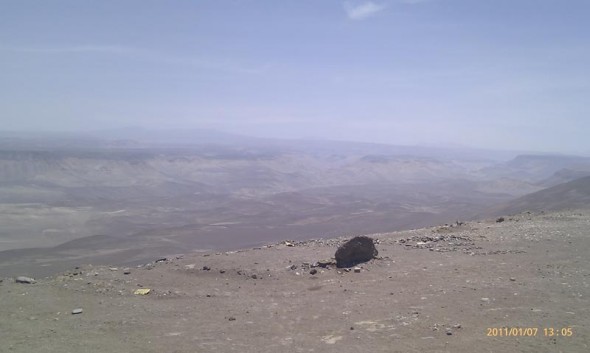



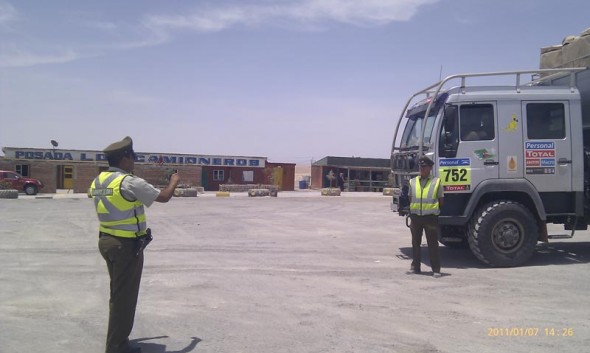




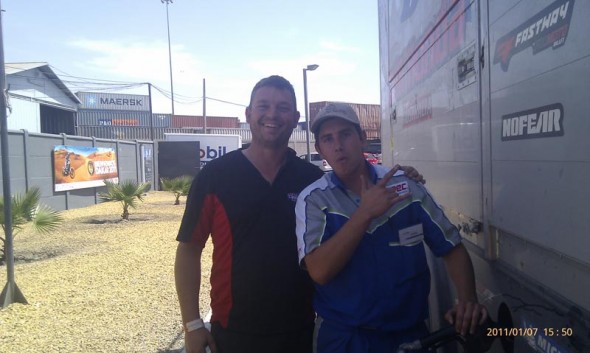





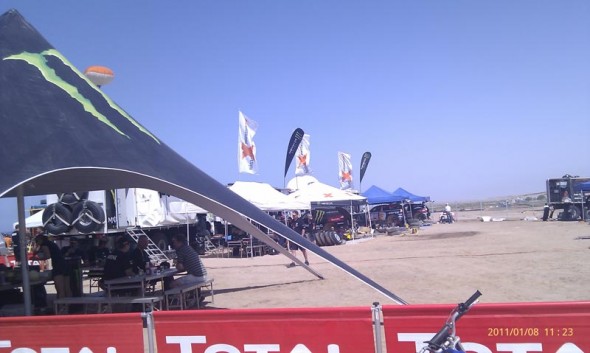

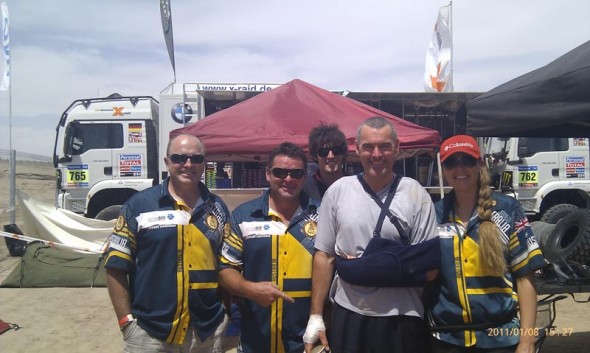




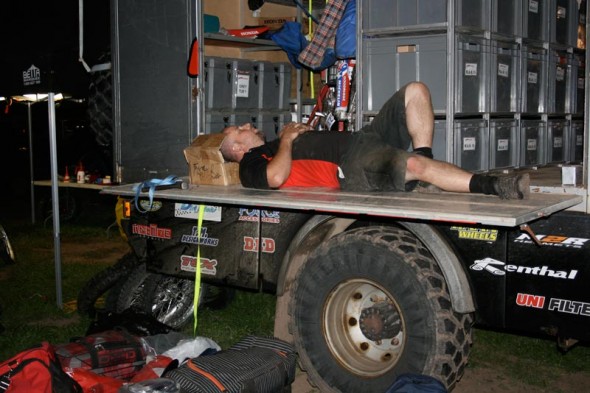





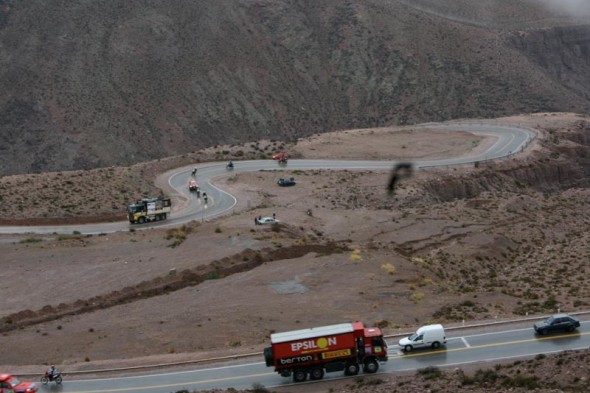


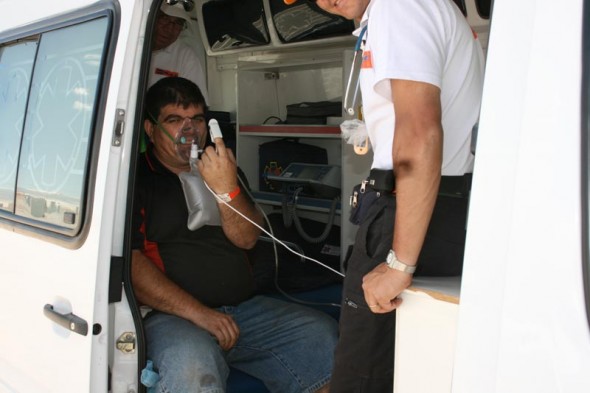











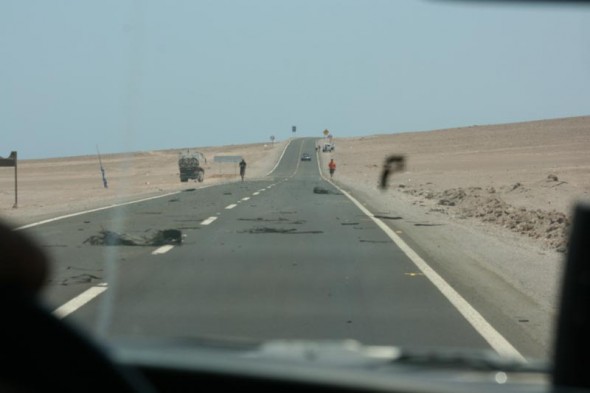











Visitor Comments